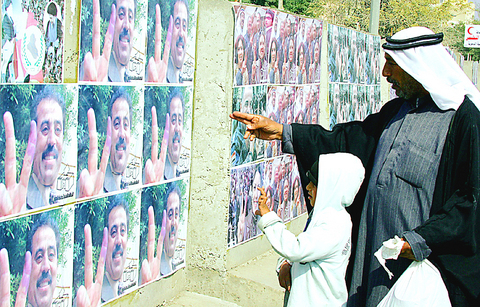A Shiite-dominated ticket won the Jan. 30 elections for the National Assembly, winning over 4 million votes -- or about 48 percent -- of the ballots cast, officials said Sunday.
A Kurdish alliance finished second with 2.175 million votes or 26 percent. The list led by US-backed Prime Minister Ayad Allawi won about 1.168 million votes -- or 13.8.

PHOTO: AFP
Officials said 8.456 million votes were distributed among the 111 candidate lists. More than 94,000 votes were declared invalid. Overall turnout was 58 percent.
The results indicate the Shiites will have to form alliances within the National Assembly to push through their agenda and select a president and prime minister. The president and two vice presidents must be elected by a two-thirds majority.
Earlier, the head of the Shiite party, Abdul-Aziz al-Hakim, had predicted his United Iraqi Alliance would win over 60 percent of the vote.
However, the results point to a major victory for the country's long oppressed Shiite majority, oppressed under Saddam Hussein and deprived of national power since the establishment of the modern Iraqi state after World War I.
The figures also indicate that many Sunni Arabs stayed at home on election day -- with only 17,893 votes -- or two percent -- cast in Anbar province in the National Assembly race, a stronghold of the Sunni Muslim insurgency.
In Ninevah province, which includes the third largest city Mosul, only 17 percent of the voters participated in the National Assembly race and 14 percent voted in the provincial council contests.
A ticket headed by the country's president Ghazi al-Yawer, a Sunni Arab, won only about 150,000 votes -- less than 2 percent. A list headed by Sunni elder statesman Adnan Pachachi took only 12,000 votes -- or 0.1 percent.
The election commission said parties have three days to lodge complaints before the results are considered official. Officials said they would be unable to determine exactly how many seats each ticket won until after the count is finalized after three days.
Pachachi told Al-Arabiya television that it was clear that "a big number of Iraqis" didn't take part in the election and "there are a some who are not correctly and adequately represented in the National Assembly," meaning his fellow Sunni Arabs.
"However, the elections are correct and a first step and we should concentrate our attention to drafting the constitution which should be written by all Iraqi factions in preparation for wider elections."
MORE BLOODSHED
The bodies of two men who worked with Allawi's party were found in a rebellious district of Baghdad yesterday, police said. In the northwest of the capital, gunmen assassinated two senior Iraqi army officers and their driver. The al-Qaeda network in Iraq claimed responsibility for the attack.
In the town of Baquba northeast of Baghdad, assailants shot dead a Communist party member who was also a local councillor.
In Mosul, a rocket attack on the city hall building killed at least two people, hospital officials said.
On Saturday, a suicide car bomb killed 18 people in Musayyib, a mixed Sunni and Shiite town south of Baghdad

US President Donald Trump yesterday announced sweeping "reciprocal tariffs" on US trading partners, including a 32 percent tax on goods from Taiwan that is set to take effect on Wednesday. At a Rose Garden event, Trump declared a 10 percent baseline tax on imports from all countries, with the White House saying it would take effect on Saturday. Countries with larger trade surpluses with the US would face higher duties beginning on Wednesday, including Taiwan (32 percent), China (34 percent), Japan (24 percent), South Korea (25 percent), Vietnam (46 percent) and Thailand (36 percent). Canada and Mexico, the two largest US trading

AIR SUPPORT: The Ministry of National Defense thanked the US for the delivery, adding that it was an indicator of the White House’s commitment to the Taiwan Relations Act Deputy Minister of National Defense Po Horng-huei (柏鴻輝) and Representative to the US Alexander Yui on Friday attended a delivery ceremony for the first of Taiwan’s long-awaited 66 F-16C/D Block 70 jets at a Lockheed Martin Corp factory in Greenville, South Carolina. “We are so proud to be the global home of the F-16 and to support Taiwan’s air defense capabilities,” US Representative William Timmons wrote on X, alongside a photograph of Taiwanese and US officials at the event. The F-16C/D Block 70 jets Taiwan ordered have the same capabilities as aircraft that had been upgraded to F-16Vs. The batch of Lockheed Martin

GRIDLOCK: The National Fire Agency’s Special Search and Rescue team is on standby to travel to the countries to help out with the rescue effort A powerful earthquake rocked Myanmar and neighboring Thailand yesterday, killing at least three people in Bangkok and burying dozens when a high-rise building under construction collapsed. Footage shared on social media from Myanmar’s second-largest city showed widespread destruction, raising fears that many were trapped under the rubble or killed. The magnitude 7.7 earthquake, with an epicenter near Mandalay in Myanmar, struck at midday and was followed by a strong magnitude 6.4 aftershock. The extent of death, injury and destruction — especially in Myanmar, which is embroiled in a civil war and where information is tightly controlled at the best of times —

China's military today said it began joint army, navy and rocket force exercises around Taiwan to "serve as a stern warning and powerful deterrent against Taiwanese independence," calling President William Lai (賴清德) a "parasite." The exercises come after Lai called Beijing a "foreign hostile force" last month. More than 10 Chinese military ships approached close to Taiwan's 24 nautical mile (44.4km) contiguous zone this morning and Taiwan sent its own warships to respond, two senior Taiwanese officials said. Taiwan has not yet detected any live fire by the Chinese military so far, one of the officials said. The drills took place after US Secretary